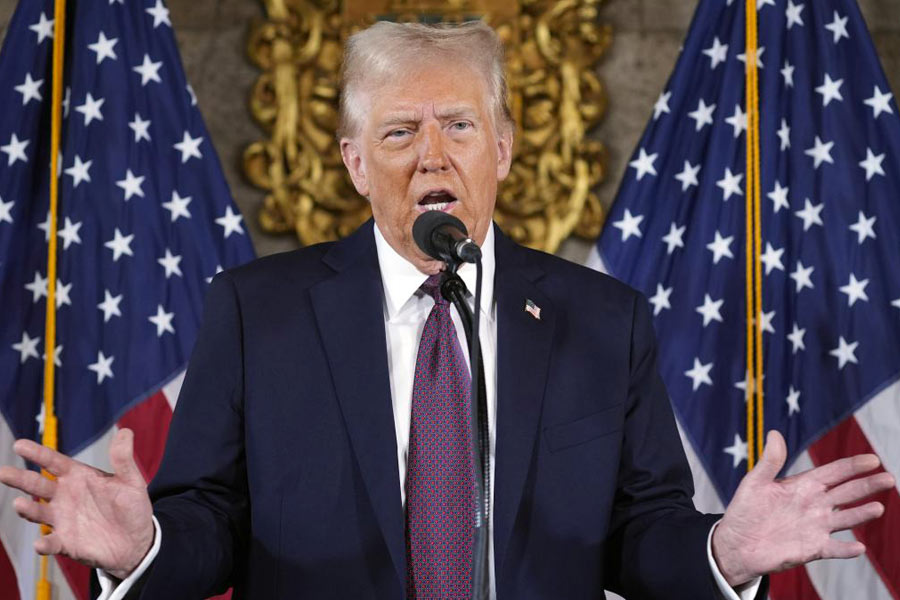Donald Trump’s election is the gift that keeps on giving for those of us who live elsewhere. Elsewhere is the world left over after subtracting the Judeo-Christian entity named for a cardinal direction, the West. For the West and its constituents — the European Union, the Anglosphere — Trump’s last term promises to be a rough spin cycle in an erratic washing machine.
China’s self-styled nemesis is doing a great job of terrifying America’s allies even before taking office. He has spoken of annexing the Panama Canal, making Canada America’s fifty-first state, and sending troops into Mexico to deal with its drug cartels. But my personal favourite is his bid to buy Greenland; he has threatened to ratchet up tariffs on Denmark’s exports to the United States of America if the country refuses to sell.
More revealing than Trump’s threats are Western responses to them. You would imagine that the guardians of the liberal international order (aka the rules-based order), committed to Ukraine’s territorial integrity and Taiwan’s right to remain independent of China, would be outraged by Trump’s provocations. Denmark’s prime minister primly said that Greenland’s status had to be the decision of the Greenlanders, Justin Trudeau defended Canada’s sovereignty before resigning as prime minister which made him look silly, and the serious broadsheets tut-tutted, said Trump will be Trump, before reading the tea leaves to decipher what he really meant.
Meanwhile Trump’s spirit guide and muse, Elon Musk, endorsed the neo-fascist Alternative for Germany, promised to donate $100 million to Nigel Farage’s right-wing Reform UK, before denouncing Farage for not politically embracing the even more right-wing criminal, Tommy Robinson. He then accused Keir Starmer of not prosecuting Pakistani gangs for grooming and raping white, working-class girls and therefore being “complicit in the mass rapes in exchange of votes.” He called for Parliament to be dissolved and fresh elections held.
A beleaguered Starmer screwed up the courage to condemn Musk for spreading lies and disinformation before conceding one of Musk’s demands: fresh inquiries into the grooming scandal. A few days later, Starmer’s commitment to propitiating Trump was on full display, as he announced that his government’s decision to transfer sovereignty over the Chagos Islands to Mauritius would be delayed to allow Trump’s incoming administration to vet the agreement. Marco Rubio and other Trump nominees had criticised the deal for potentially ceding influence to China, which has a trade agreement with Mauritius.
Trump’s ascension is as important for what it makes visible as it is for what he might do as president. It has been obvious for decades that the countries of the Anglosphere like the United Kingdom, Australia and Canada surf the world using America’s sinews. The intelligence-sharing network called the Five Eyes that consists of the old white Commonwealth and the US is not a partnership in the same way as AUKUS; the new security partnership in the Indo-Pacific is not a partnership. America is the fulcrum of these arrangements; the other countries are always clients.
What is new with Trump is his willingness to rub the noses of America’s clients in the dirt in public. Witness the UK’s halting attempts at outreach to China. Rachel Reeves, the chancellor, visited China desperate for trade agreements that might kickstart a stagnant British economy. The new British ambassador to the US, Peter Mandelson, had in Trump’s first term stressed the need for good economic relations with China and criticised Trump for trying to isolate China. In his new avatar, he has reversed himself to stay in step with Trump’s hostility to China: he now believes that “[t]he Chinese government I have observed intensively over the past 20 years is more aggressive abroad and controlling at home and in many sectors, now directly challenges Western governments and our values.” Given that Mandelson called Trump a bully and a mercantilist as recently as 2018 for trying to put China in the “naughty corner”, it’s clear that Britain will do what it takes to stay aboard the US bandwagon because its place in the world depends on it.
It’s also predictable that Britain, Germany and the rest of the West (barring exceptions like Ireland) will follow Trump’s lead on Israel/Palestine. This is no different from what these countries did during Joe Biden’s presidency: Starmer’s frantic manoeuvring as leader of the Opposition to avoid a parliamentary debate on a Scottish Nationalist Party motion for an unconditional ceasefire where he successfully suborned the Speaker was a good example of Britain’s deference to her master’s voice.
Should Trump push Volodymyr Zelensky into a deal with Vladimir Putin that involves a territory-for-peace trade-off, every European country, including those like Britain who have thus far supported Ukraine in its stated goal of winning back every inch of ceded ground, will find a way of rationalising their U-turns because strategic disagreement with the leader of the free world is not an option.
India’s size and its traditional unwillingness to sacrifice its room for manoeuvre between power blocs make it hard for Indians to appreciate the extent to which the political establishments of Western countries have traded strategic sovereignty for American protection. Their clientage used to be obscured by the liberal international order, which performed multilateralism by sharing the leadership of the institutions of global governance among America, Europe and Japan. Trump’s transactional, rent-seeking style does the rest of the world a favour by nakedly asserting American supremacy.
It’s important to recognise that Trump’s America won’t be a departure from Biden’s in the realm of geopolitics. It was Biden who objected to Nippon Steel’s acquisition of US Steel on the grounds of national security even though Japan has been America’s most steadfast ally in East Asia. It was Biden who pushed for a ban on TikTok, and Biden again who built on Trump’s hostile posture to China during his first term. The clownish hostility provoked by the first real challenge to American hegemony in decades, the obsessive belief that all things Chinese, from solar panels to electric vehicles to social media apps, were sneaky ways of subverting America, has helped dramatise, for the rest of us, the relative decline of the West. This alarmism isn’t confined to trolls and tabloids: the Financial Times just carried an article that analysed in statistical detail the insidious power of TikTok over Taiwan’s young people who weren’t as hostile to China as earlier cohorts used to be.
Lourenco Goncalves, the CEO of Cleveland-Cliffs, an American steelmaker in the running to buy US Steel, launched an unhinged attack on Nippon Steel’s bid recently, saying, “China is bad. China is evil. China is horrible. But Japan is worse. Japan is a lot worse. Japan is evil.” Goncalves doesn’t speak for Trump’s incoming administration, but he uses the idiom that it has normalised.
A series of novels written in the early 20th century by Sax Rohmer were centred on a villain called Fu Manchu. “Imagine,” wrote Rohmer, “a person, tall, lean and feline, high-shouldered, with a brow like Shakespeare and a face like Satan... Invest him with all the cruel cunning of an entire Eastern race, accumulated in one giant intellect, with all the resources of science past and present... Imagine that awful being, and you have a mental picture of Dr. Fu-Manchu, the Yellow Peril incarnate in one man.”
Replace Fu with Xi and the West is there again.
mukulkesavan@hotmail.com











